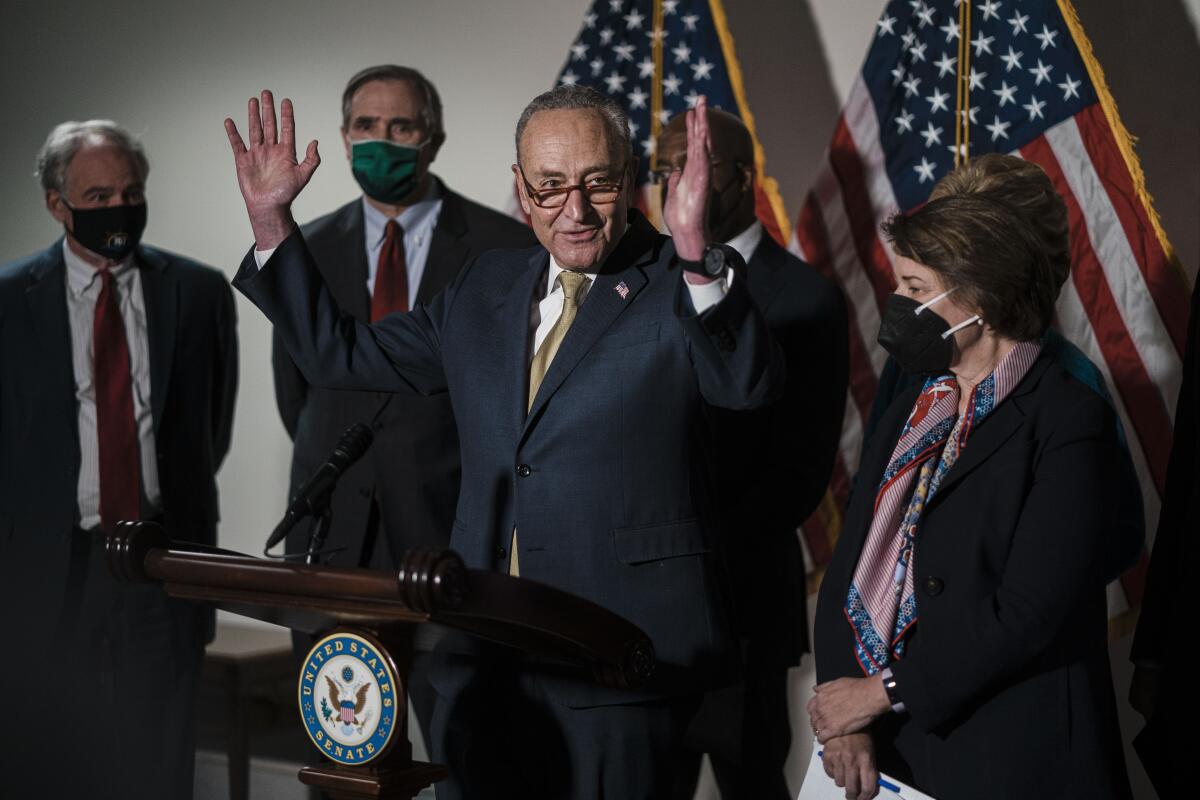Republicans block Democrats’ voting rights push in the Senate

WASHINGTON — Senate Republicans on Wednesday blocked President Biden’s voting rights measures, handing Democrats their second high-profile setback in as many months.
A procedural vote to advance a pair of voting rights bills failed 49-51, far short of the 60 votes required to prevent a GOP filibuster.
Senate Democrats unanimously supported the John R. Lewis Voting Rights Advancement Act and the Freedom to Vote Act, calling them critical to ensuring fair elections amid efforts in GOP-led states to erect new barriers to voting. Senate Majority Leader Charles E. Schumer (D-N.Y.) changed his vote to “no” as a procedural move to allow him to bring up the legislation again.
Among other things, the voting rights bills would have expanded voter registration with automatic and same-day registration, increased access to the polls by expanding early and absentee voting, and created new criteria for determining which states must receive preapproval from the Justice Department or U.S. District Court for the District of Columbia before enacting laws that would affect voting rights.
Senate Democrats then pivoted to a last-ditch effort to change the 60-vote threshold into a so-called talking filibuster, which would allow each member to speak twice for as long as they want before a simple majority vote on final passage.
But as expected, that effort also failed, with centrist Sens. Joe Manchin III of West Virginia and Kyrsten Sinema of Arizona joining all 50 Republicans in support of keeping the current rules.
Democratic leaders said it was important to hold the votes on principle.
“Make no mistake: Win, lose or draw, members of this chamber were elected to debate and to vote, particularly on such an important issue as this,” Schumer said on the floor.
“History is watching us,” Sen. Raphael Warnock (D-Ga.) said shortly before the vote on voting rights.
That vote came hours after the president faced the White House press corps in a nearly two-hour news conference marking one year into his administration.
“I haven’t given up,” Biden said. “I’ve been engaged a long time in public policy, and I don’t know many things that have been done in one fell swoop. And so I think the most important thing to do is try to inform — not educate — inform the public of what’s at stake in stark terms, and let them make judgments and let them know who’s for them and who’s against and who’s there and who’s not.”
As the president answered questions, Manchin spoke on the Senate floor to reiterate his position and challenge the chamber to work together,
“I cannot support such a perilous course for this nation when elected leaders are sent to Washington to unite our country, not to divide our country,” Manchin said of efforts to change the filibuster rules. “We’re called the United States, not the Divided States, and putting politics and party aside is what we’re supposed to do. It’s time we do the hard work to forge a difficult compromise.”
Manchin’s opposition late last year to the president’s signature social spending and climate bill essentially killed that legislation. Democrats then turned to voting rights, only to see that effort, too, derailed by Manchin and Sinema.
Other Senate Democrats said it was important to hold the vote to see where every member stood.
The internal fight in the Democratic Party over whether to scrap the filibuster rule was one of several issues that have pitted centrists and progressives against one another, blocking several parts of Biden’s agenda.
Progressives say abandoning the rule is the only way the party will be able to deliver on its promises to voters before November’s midterm election, when Republicans are hopeful they can retake one or both chambers of Congress.
In a rare bright spot for the Senate Democratic Caucus, Sen. Mark Kelly of Arizona announced his support for the filibuster changes ahead of the vote. Kelly, a retired astronaut and veteran, is up for reelection this year.
“If NASA or the Navy functioned like the United States Senate, we would never get the rocket off the launchpad and in combat we’d never complete the mission,” Kelly said in a statement. “I’ve considered what rules changes would mean not just today, but years down the road, for both parties and all Arizonans. If campaign finance and voting rights reforms are blocked again this week, I will support the proposed changes to pass them with a majority vote.”
Senate Minority Leader Mitch McConnell (R-Ky.) called Democrats’ effort “a sad spectacle” and “a direct assault on the core identity of the Senate” by Schumer. He said his Democratic colleagues should be focused on issues like inflation, the pandemic, rising homicides, the southern border and Russia’s flirtation with war.
“The administration and this Senate majority are focused on none of it,” McConnell said on the floor. “Instead, they’ve been consumed by a fake panic over election laws that seems to exist only in their imaginations.”
Though Democrats have said changing the filibuster is worth the risk of handing a future Republican majority a 51-vote threshold to pass its legislative priorities, GOP leaders have insisted their position to protect the filibuster won’t change based on whether they’re the party in power. They’ve highlighted the filibuster as a tool that prevents the Senate from operating like the House by requiring compromise and fending off wild swings in policymaking.
“That’s not an option for us,” Sen. John Thune of South Dakota, the No. 2 Republican leader, said of filibuster reform. “If it were, we would’ve done it two years ago, four years ago, when we were getting the incessant pressure from the [Trump] administration to do it.”
More to Read
Get the L.A. Times Politics newsletter
Deeply reported insights into legislation, politics and policy from Sacramento, Washington and beyond. In your inbox three times per week.
You may occasionally receive promotional content from the Los Angeles Times.











